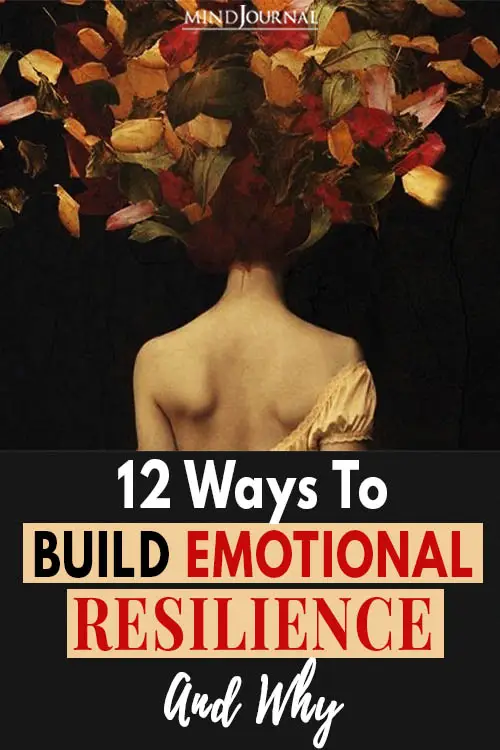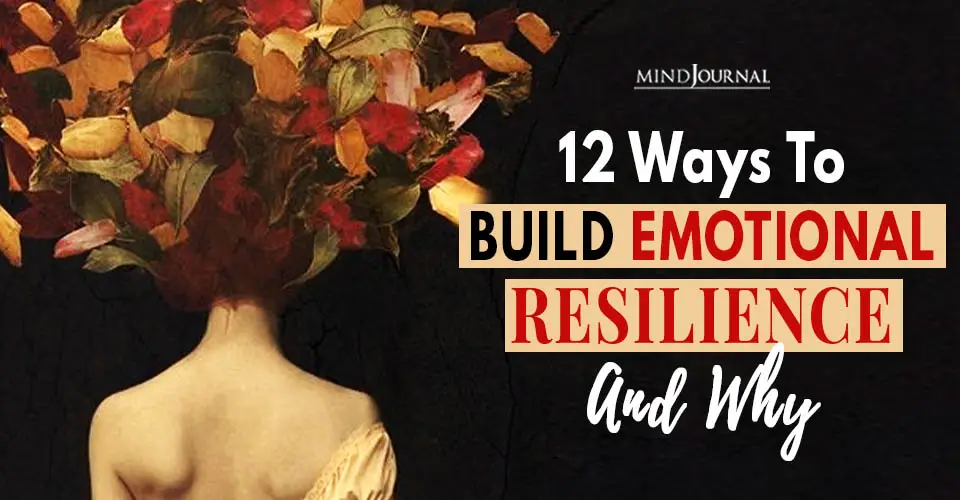Building emotional resilience is a powerful thing to do. Why? Because if you build emotional resilience, you can be emotionally resilient. Some people are naturally more resilient than others. I wasn’t one of them.
Because I lacked emotional resilience as a child, it deepened my childhood trauma.
As I’ve healed of my trauma I’ve also been building this thing called emotional resilience. I’ll show 12 ways you can build it and why you’d want to.
Being emotionally resilient will serve you in many ways.
WHAT EMOTIONAL RESILIENCE IS
Simply put, to be emotionally resilient is the ability to bounce back. But there’s more to it than that.
Before this word applied to people, it was a mechanical definition.
In an old dictionary from 1950, it means: returning to or resuming the original position or shape. Mech. (mechanical) capable of withstanding shock without permanent deformation or rupture. (emphasis mine)
Resilient comes from the word resile which means to spring back or recoil. Like a spring.
When a person has resiliency they possess the power to recover quickly from difficulty, crisis, stress, and hardship.
Resiliency is a psychological strength to cope instead of falling apart. People with strong resiliency can maintain their cool even in disastrous situations. It doesn’t mean they don’t feel the stress. It means they have the ability to handle it instead of running from it or emotionally shutting down.
Read Your Biggest Emotional Trigger, Based On Your Zodiac Sign
A person with resilience also isn’t afraid to ask for help when needed.
Resilience is not about gritting your teeth and getting through or sucking it up. Resilience is about honoring our need to ask for and receive help. It is important to remember that you are not going it alone. There is always someone who can help and there is always hope. ~Dr. Mollie Marti, founder, and President, National Resilience Institute
This is quite an admirable quality to have.
To be resilient is the ability to thrive instead of being traumatized.
HOW BEING RESILIENT MATTERS
Resiliency empowers a person to grow stronger through adversity. By exercising it they become even more resilient.
Resilience gives a person the capacity to deal with things and adapt in a positive way.
Resilient people live longer because they have a sense of purpose.
A Rush University Research team studied 951 men and women with an average age of 80.4 years. Those with the lowest sense of purpose were twice as likely to develop Alzheimer’s disease as those who were living meaningful lives. source
I want to grow in resilience. How about you?
Being resilient makes you stronger on the inside to handle life on the outside.
“Resilience is a muscle. Flex it enough and it will take less effort to get over the emotional punches each time.”—Alecia Moore
WHAT LACK OF RESILIENCE LOOKS LIKE
Resilience isn’t something you have, or you don’t have. It comes in varying amounts. A person can be resilient in one area of their life and not in a different area. Here are a few areas that show a lack of resilience:
- Unable to calm self and focus on useful action in a crisis.
- Seeing difficulties as permanent with no expectation to overcome.
- Unable to tolerate uncertainty or adapt to new developments.
- Inability to laugh at one’s self. Poor self-concept.
- Lack of curiosity. Fear of new things.
- Can’t listen or empathize.
- Unable to see silver linings or make use of difficulties.
These are just a few. But if you find yourself in them, don’t feel bad.
Read 10 Signs Of Emotional Numbness and Ways To Recover
Wherever you lack emotional resilience, you can build it.
“Resilience is a muscle. Flex it enough and it will take less effort to get over the emotional punches each time.”—Alecia Moore
12 WAYS YOU CAN BUILD EMOTIONAL RESILIENCE
1. Feed on the positive
This is more than just looking on the bright side. It’s recognizing your strengths and finding ways to overcome your weaknesses. You can take all your weaknesses to God and ask for help. He said that where you’re weak, he’s strong.
2. Grow your sense of humor
Being able to laugh at yourself and life’s frustrations lessens stress. It empowers you to bond with others in difficult times. Laughter has many life-giving benefits in addition to building resilience. Laugh more.
3. Move your body
Physical exercise will provide endorphins causing your level of resilience to increase. Take a walk. Join a gym. However, you can increase your activity is a plus.
4. Mental exercise
Exercising your mind keeps it sharper. Resilient people are always learning for the sake of learning.
A 2004 study by Cathie Hammond at the University of London concluded that lifelong learning was associated with “…a range of health outcomes; well-being, protection and recovery from mental health difficulties, and the capacity to cope with potentially stress-inducing circumstances; … self-esteem, self-efficacy, a sense of purpose and hope, competences, and social integration. Learning developed these psychosocial qualities through extending boundaries, a process which is quintessential to learning. source
Being resilient makes you stronger on the inside to handle life on the outside.
Read How to Stimulate Your Vagus Nerve for Better Physical and Mental Health
5. Feed your spirit life
Practising spirituality plays an important role in overcoming tragedy. For example; prayer, gratitude, reading scriptures and other inspirational words. These things provide a feeling of connectedness and grounding. Being part of a group that shares your beliefs makes this tool even stronger.
6. Friendship
Friendship comes in varying depths. From deep friendships to simply being a friend by being kind to a stranger. Both the giving and receiving of friendship creates inner support. The Bible tells us two are better than one because a friend helps you get up again when you fall down.

7. Practice courage
Courage is not the absence of fear. It’s making the decision to face the fear and take action while still feeling afraid. Practicing courage builds resilience in the form of bravery.
8. Know your moral compass
A moral compass is an inner guide that distinguishes right from wrong. Morals strengthen a person’s resolve in difficult times. This means you’ll be compelled to do what’s right even when you feel like you can’t.
9. Develop purpose
Having a purpose in life is what gets us out of bed in the morning. The stronger the sense of purpose, the greater the resilience. Having a purpose doesn’t have to be a grand overture or huge undertaking (although it can be). It just needs to be a fire burning in the heart, like a pilot light.
Read How To Cultivate Your Sense of Purpose
10. Take ownership
Psychology calls this developing an internal locus of control. People who’ve been traumatized feel lost without any control. It’s true there are many things we can’t control, but there are many things that we can. Reclaiming what belongs to you builds resilience.
11. Grow healthy attitudes
Psychology calls this a growth mindset. A growth mindset will look at life’s difficulties as challenges instead of roadblocks. This empowers action and problem solving instead of self-pity or victim thinking. Growing healthy attitudes is done by reprogramming the mind.
12. Emotional awareness
Childhood and emotional trauma strip a person of emotional awareness. This is knowing what you’re feeling and why. When I was in counseling, I was told to journal my feelings. Just write them down. This was the beginning of becoming emotionally aware. If you know what you’re feeling, then you can be intentional in your response instead of reactionary.
Choosing to act on even one of these 12 ways will help you build emotional resilience.
Written by: Danielle Bernock
Originally appeared on: Daniellebernock.com
Republished with permission









Leave a Reply
You must be logged in to post a comment.